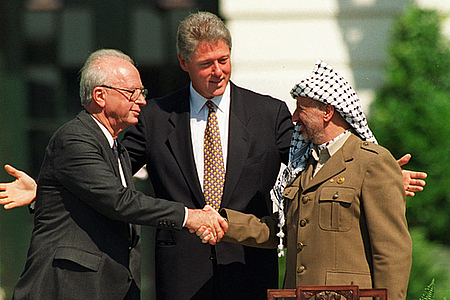Published: march 07, 2010; Yitzhak Rabin’s Vision and the Direction of Middle East Politics.
by Barry Rubin
I’ve long been a big Yehuda Avner fan. He writes terrific articles about his personal experiences as advisor to many Israeli prime ministers and as a high-level diplomat. But nothing prepared me for the story he tells in his new book, The Prime Ministers: An Intimate Narrative of Israeli Leadership, published by Toby Press (of which I’m also a big fan. I urge you to look at their catalogue, much of which consists of translated novels avialable nowhere else).

Minister Yitzhak Rabin, left, President Clinton, middle, and Palestinian leader Yasser Arafat, right, in Washington. (AP Photo/Ron Edmonds, File)
On November 1, 1995, just three days before Prime Minister Yitzhak Rabin was assassinated, Avner asked him why he made the Oslo agreement deal with Yasir Arafat. Rabin’s answer is extremely close to my own analysis fifteen years later: that the great issue of this era in the Middle East is the battle of nationalists versus Islamists; that this factor offered a chance to reduce or eliminate the Arab-Israeli conflict; but that if the Islamists won things would be much worse.
Rabin explained that the Middle East was characterized increasingly by growing instability in many states. Of special importance was “Iranian-inspired (and financed) Islamic fundamentalism” which threatened most of the area’s countries and had already brought the deaths of hundreds of thousands of people.
According to Avner, Rabin continued that this situation had brought common interests between most Arab states and Israel since their “long-term strategic interest is the same as ours” and they recognize “they have less to fear from Israel than from their Muslim neighbors, not least from radicalized Islamic powers going nuclear.”
The triumph of the Islamists would make resolution of the Arab-Israeli conflict impossible (not that it was so easy before) since they would turn it into a solely religious conflict. “And while a political conflict is possible to solve through negotiation and compromise, there are no solutions to a theological conflict. Then it is jihad – religious war: their God against our God. Were they to win, our conflict would go from war to war, and from stalemate to stalemate.”
Rabin concluded:
“And that, essentially is why I agreed to Oslo and shook hands, albeit reluctantly, with Yasir Arafat. He and his PLO represent the last vestige of secular Palestinian nationalism. We have nobody else to deal with. It is either the PLO or nothing. It is a long shot for a possible settlement, or the certainty of no settlement at all at a time when the radicals are going nuclear.”
If Rabin had lived five years more he might well have (I think probably would have) concluded that a comprehensive political settlement with Arafat was also impossible. He already suspected that. But it was still better to work with the PLO’s heir, the Palestinian Authority, then to watch Hamas take over. Indeed, it did take over the Gaza Strip. And Islamism produced two wars for Israel, with Hizballah in 2006 and with Hamas in 2009. Today, too, Iran’s drive for nuclear weapons is a far more visible factor than it was fifteen years ago.
The nationalists in general were unwilling or unable to make a comprehensive peace with Israel, though one should not forget Egypt and Jordan making at least a treaty, but the rest of Rabin’s vision came true. May his memory be even more blessed.
About the Author:
Barry Rubin is director of the Global Research in International Affairs (GLORIA) Center and editor of the Middle East Review of International Affairs (MERIA) Journal. His latest books are The Israel-Arab Reader (seventh edition), The Long War for Freedom: The Arab Struggle for Democracy in the Middle East (Wiley), and The Truth About Syria (Palgrave-Macmillan). His new edited books include Lebanon: Liberation, Conflict and Crisis; Guide to Islamist Movements; Conflict and Insurgency in the Middle East; and The Muslim Brotherhood.



 RSS
RSS










Middle East Affairs Information Center (MEAIC): Fact finding and in depth information on M… http://reduce.li/ojct9r #vision
Yitzhak Rabin's Vision #israel #plo http://j.mp/aWj3zP
Yitzhak Rabin's Vision #israel #plo http://j.mp/aWj3zP
RT @CrethiPlethi: Yitzhak Rabin's Vision #israel #plo http://j.mp/aWj3zP
Yitzhak Rabin’s Vision – http://t.co/VwieKQv